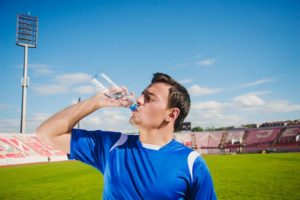Nutrition is an essential part of having a great athletic performance. Soccer players need to ensure they are feeding their bodies properly.

This would enable them to maintain their energy levels, improve their endurance, and recover effectively.
In case you’re wondering what should a pre-match meal be like? Read on to discover what foods to eat and the proper time to eat before an important game.
Pre-game Nutrition Advice for Soccer Players
Here is some general pre-game nutrition advice for soccer players.
Eat a Balanced Diet
Soccer players should always aim for a balanced diet. Focus on fueling their bodies with nutrient-dense foods.
These are foods that provide the energy and nutrients they need to perform at their best.
That includes plenty of fruits, vegetables, whole grains, lean proteins, and healthy fats.
Carbohydrates are extremely important for soccer players, as they provide the energy you need.
Time Your Meals and Snacks
The timing of your meals will determine how fueled you are for your game. If your meal is well-planned, you will be nourished and well-hydrated for your game.
Eating the right foods before a game can help provide the energy and nutrients your body needs for optimal performance.
What to Eat 3-4 Hours Before a Game
Generally, you should aim to eat a well-balanced meal about three to four hours before a soccer game.
This will give your body enough time to digest the food and convert it into energy. A well-balanced meal should contain complex carbohydrates, protein, and healthy fats.
Carbohydrates
Carbohydrates are essential for providing energy to the muscles during the game. They keep you nourished from start to finish.
Some good carbohydrate sources to eat before a soccer game include:
- whole grain bread or crackers, brown rice, pasta, quinoa.
- fruits such as bananas or apples.
- vegetables such as sweet potatoes or carrots.
Protein
Protein can help to build and repair muscle tissue and can also help to keep you feeling full and satisfied.
Some good protein sources to eat before a soccer game include grilled chicken or fish, hard-boiled eggs, Greek yogurt, cottage cheese, and tofu.
Healthy Fats
Healthy fats are important for maintaining cell function and providing energy during exercise.
Some good sources of healthy fats to eat before a soccer game include nuts and seeds, avocado, olive oil, and fatty fish such as salmon.
Stick to meals that your body recognizes. If you’re going to a faraway place for a game, bring your favorite snacks with you.
Otherwise, ensure you’ll have something you’re familiar with wherever you stay.
Even when you schedule your meals perfectly, you might need to replenish yourself again before the game starts.
What to Eat 1-2 Hours Before a Game

Eating a meal or snack 2-3 hours before a game can provide the body with the energy it needs to perform at its best.
Here are some suggestions for what to eat 1-2 hours before a soccer game.
Some examples of pre-game meals or snacks that incorporate these nutrient categories include:
- Grilled chicken with brown rice and steamed vegetables.
- Whole wheat pasta with tomato sauce and a side salad with mixed greens and vegetables.
- Turkey or peanut butter sandwich on whole grain bread with a piece of fruit.
- Greek yogurt with mixed berries and a handful of almonds.
- Tuna salad with mixed greens and whole-grain crackers.
- Quinoa bowl with grilled chicken, roasted vegetables, and a drizzle of olive oil.
It’s important to listen to your body by experimenting with different pre-game meals and snacks.
Start eating this meal at least a month before the game.
This way, you can know what works best for you and acclimate your bowels to morning digestion.
However, be sure to avoid foods that can cause discomfort, such as spicy or high-fat foods.
An Hour Before the Game
You shouldn’t play on an empty stomach. However, you shouldn’t play on a full stomach either.
To keep your energy up, you can eat an hour before the game.
You can try out healthy snack options like toasted bread and jam, a banana, portions of fruits, or energy bars.
Eating a small snack, 30 minutes to an hour before exercise can also be useful.
Choose Digestible Food
Eat foods that are easily digestible. Your body is provided with energy without causing discomfort or digestive issues during the game.
This way you can free up the stomach before the game begins.
Stay Hydrated
Soccer players should drink plenty of fluids before, during, and after training and games to maintain hydration levels.
Normally, you should consume about 2-3 glasses of water or isotonic drink to stay hydrated.
Water is the best option, but sports drinks can also be useful during intense exercise to replace lost electrolytes.
Do this, especially if you’ll be playing for a long time in hot weather. While it’s important to stay hydrated, avoid sugary drinks or caffeine.
These can dehydrate you and negatively affect your performance.

Refuel after the Game
After a game, soccer players need to refuel their bodies. For this, it is recommended to carry a small cooler to aid your post-game craving.
You can do this with a combination of carbohydrates and protein.
Try out foods such as a banana with nut butter, a protein shake, or a turkey sandwich on whole-grain bread. You can eat a well-balanced supper once you get home.
What Foods Should You Avoid Before Game Time?
Before playing soccer, it’s important to avoid certain foods that can negatively affect your performance or cause discomfort.
Here are the types of foods to avoid before playing soccer:
Foods High in Fats and Fiber
High-fatty foods can take longer to digest. This may cause discomfort while running around during the game.
Examples include fried foods, fatty cuts of meat, and full-fat dairy products.
Spicy Foods
Spicy foods can cause heartburn, indigestion, and other discomfort. This can interfere with performance and comfort while playing.
Meals in Large Quantities
Eating a large meal too close to playing soccer can cause bloating, cramping, and discomfort. It’s best to eat a light meal or snack 1-2 hours before playing.
Sugary Foods and Drinks
Again, Sugary foods and drinks can provide a quick burst of energy. The downside is that this energy is short-lived and can lead to a crash.
Additionally, consuming too much sugar can lead to dehydration.
Alcohol
Consuming alcohol before a game is a big no-no. Alcohol can dehydrate the body and impair judgment and coordination. Both of these are detrimental while playing soccer.
Can You Take Caffeine Before a Game?
Taking caffeine before a game is a two-way street. While caffeine can provide a boost of energy and alertness, it can also cause dehydration and affect your performance.
The best thing to do is consume in moderate quantity. Do not abuse your intake. Some people are used to having coffee for breakfast.
If this is you, you can drink it as long as you can visit the bathroom before the race.
Conclusion
For personalized nutrition advice, soccer players can consider working with a sports nutritionist.
They provide tailored recommendations based on individual needs and goals.
Particularly, if you’re on a weight loss or diet, a sports nutritionist can determine your calorie expenditure.

I was working as a mountain guide, probably all around the planet. One day, I met my wife in the mountains, literally on top of the world. Now, I have a beautiful family and three kids, so I don’t have much time for climbing, but sometimes I go camping with my friends. I am also into gym workouts, and I can’t imagine my life without sports.
Since I ended my professional career as a climbing guide, I’ve been giving personal classes and helping amateurs to get ready for conquering their first peaks. Also, that’s how the whole blog idea appeared.





